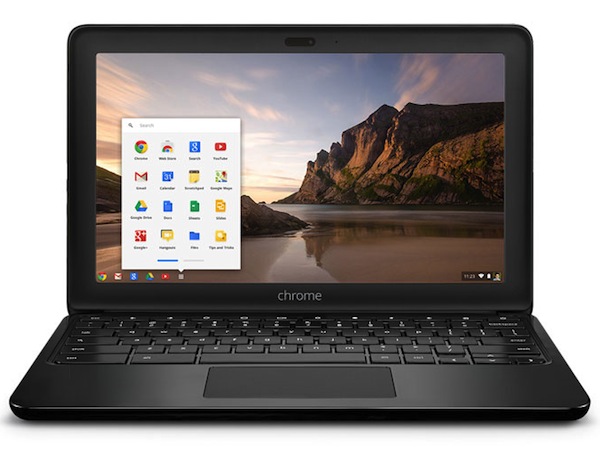You Can Get Windows Desktop on Chromebook via VMWare
Windows-flavored Chromebooks thanks to VMWare.
Google and VMware are teaming up to bring Windows to the search giant's Chromebook laptops. Chromebooks run on Google's Chrome OS and are only able to run Chrome apps. As a result, these machines aren't exactly optimized for a corporate setting. However, VMware is hoping to change that.
Speaking today at its annual VMware Partner Exchange, the company announced plans to provide businesses with secure, cloud access to Windows apps, data and desktops via Chromebooks. Chromebook users will be able to access their Windows apps, data and desktops using VMware's Blast HTML5 technology from a Web app on their Chromebook. Google reckons this solution will save businesses about $5,000 per computer compared to PC deployment using traditional PCs.
"Chromebooks are designed for the way people use computers today and are a secure, easy and cost-effective solution to help organizations embrace a new way of doing business," said Amit Singh, President of Google Enterprise. "Through our partnership with VMware, businesses can now capitalize on these advantages with access to legacy applications, data and desktops they need to keep employees productive."
This option is initially only going to be available as an 'on-premise service' and will be fully managed by VMware. Of course, with Chromebooks comes a need for trust in cloud computing, something companies like Google and Microsoft are working on. In fact, Microsoft's new CEO comes from the company's Cloud and Enterprise group. Perhaps this combined solution will help coax corporations towards the cloud.
Follow Jane McEntegart @JaneMcEntegart. Follow us @tomshardware, on Facebook and on Google+.
Get Tom's Hardware's best news and in-depth reviews, straight to your inbox.

Jane McEntegart is a writer, editor, and marketing communications professional with 17 years of experience in the technology industry. She has written about a wide range of technology topics, including smartphones, tablets, and game consoles. Her articles have been published in Tom's Guide, Tom's Hardware, MobileSyrup, and Edge Up.
-
amdfangirl I sure hope the companies pay for the workers to have LTE, said LTE fast enough to cope with it all and very good LTE network coverage or they're gonna have a pile of useless laptops.Reply -
JD88 Reply12680049 said:I sure hope the companies pay for the workers to have LTE, said LTE fast enough to cope with it all and very good LTE network coverage or they're gonna have a pile of useless laptops.
Not really necessary, at least in the first world. I can't remember the last time I was somewhere other than on a plane with no WiFi. Also, it's not like a Windows PC would behave differently as you would still need connectivity to access a corporate network. -
amdfangirl I mean here in backwards Australia there's no WiFi on buses (they have that in HK, it's very flaky), no WiFi on trains, sometimes WiFi in public places like coffee shops... rarely see them in restruants. The only retail store I know of that has free WiFi is Target.Reply
I guess these chromebooks would be useful if the whole ecosystem depended on remote accessing a work computer, but I mean like without WiFi or when you get flaky WiFi at least you still have your full Office suite complete with Word and Excel for VBA macros and whatever it is corporate types get up to.
Then again I'm thinking of everything from MY perspective which is really skewed given all I want to do is run Creative Suite on my laptop :P. -
sunflier I see no cost justification adding Chromebooks. I realize someone will say, well the Chromebook is cheaper than a typical corporate desktop/laptop. While this may be true the real cost won’t be hardware based the REAL cost will come supporting Chromebook running a virtual copy of Windows running user/company applications on top of that. I can’t imagine adding another layer of support for all of this. Chromebook bound companies better beef up their Helpdesk/Desktop Technician workforce.Reply -
drapacioli ReplySo, if you're buying this for 4k video, assuming 700MB/second uncompressed video, you can have either 23, 46, or 93 SECONDS of video per card? Better get that shot in fast, no space for a retake!
Actually, that's not fair, it says the card only supports 30MB/s constant speed, so the video must be compressed to work. Still, even then you're talking 9/18/36 minutes per card assuming max constant speed bitrate. -
w8gaming How is it going to save $5000 per deployment when Microsoft is still going to charge the Windows licensing fee for running it in the cloud. Microsoft has never offered Windows free when the user tries to run it in a virtual environment, it is not going to change now.Reply
